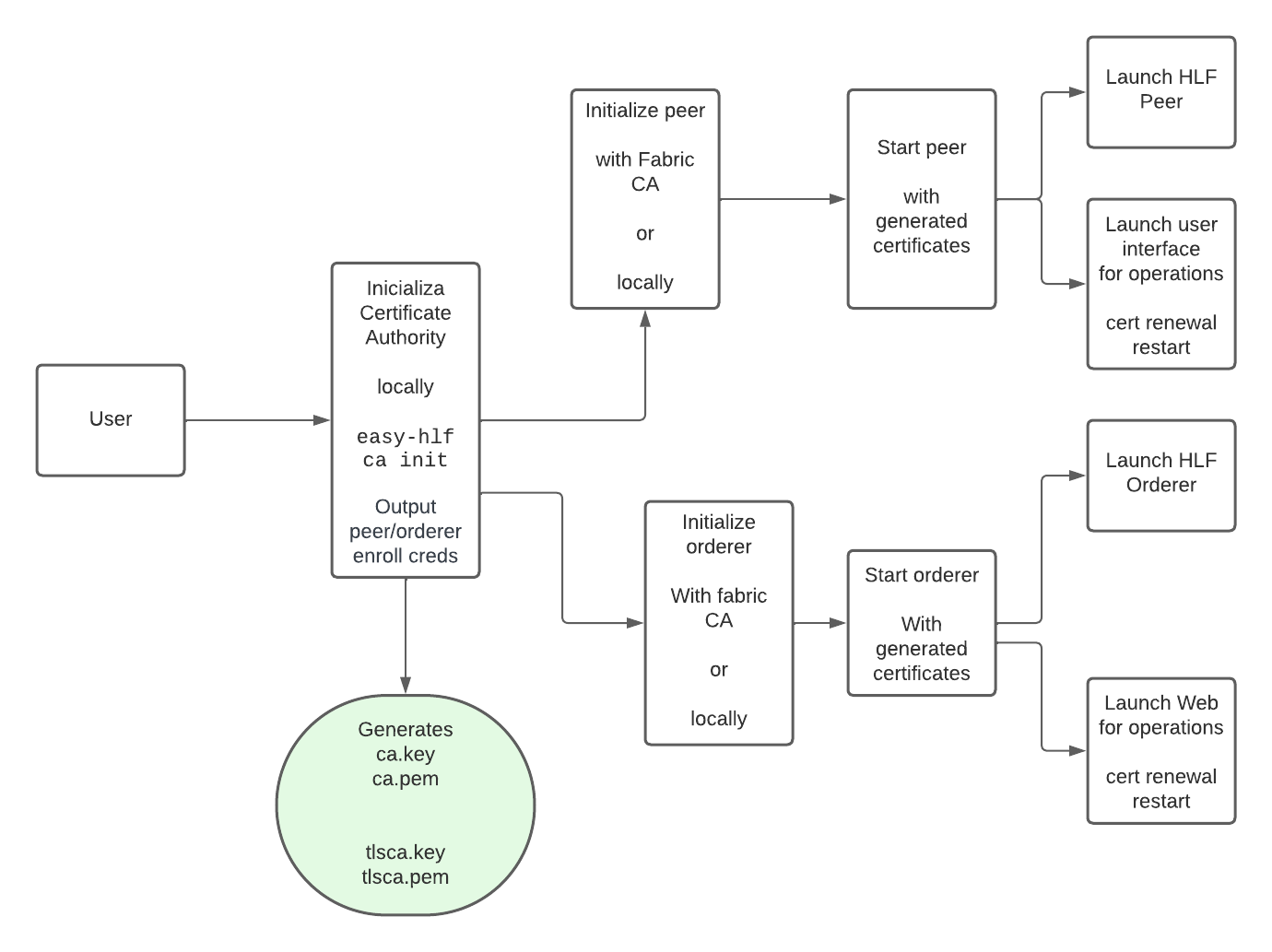HLF Easy is a tool to simplify the process of setting up Hyperledger Fabric nodes. It is designed to be used in baremetal environment.
- HLF Peer binaries
- HLF Orderer binaries
curl -sSLO https://raw.githubusercontent.com/hyperledger/fabric/main/scripts/install-fabric.sh && chmod +x install-fabric.sh
./install-fabric.sh 2.5.5go build -o hlf-easy ./main.go && sudo mv hlf-easy /usr/local/bin/hlf-easy Complete the meetup 2024 to get a running network with 2 peer organizations and 1 orderer organization.
Repository: https://github.com/kfsoftware/meetup-k8s-hlf-2024
Youtube: https://www.youtube.com/watch?v=8qPXaRzrFiQ
After initializing the certificate authority, you can inspect the certificate authority to get the certificates.
All the certificates will be saved in $HOME/hlf-easy with a custom structure.
hlf-easy ca init --hosts=192.168.1.36 --hosts localhost --hosts 127.0.0.1 --hosts ca.localho.st --name=ca-1
hlf-easy ca inspect --name=ca-1 > localorg1-ca.yaml
Once we have the certificates generated we need to initialize the peer certificates.
First, we need to find our external IP address, this is the IP address that the network nodes will use to connect to the peer.
You can use ifconfig or ip a to find the IP address of the interface that is connected to the network.
export EXTERNAL_HOST=192.168.1.36 And then, we can initialize the peer certificates.
hlf-easy peer init --hosts=${EXTERNAL_HOST} --hosts localhost --hosts 127.0.0.1 --hosts peer01.localho.st --ca-name=ca-1 --id=peer1 --local=true
hlf-easy peer init --hosts=${EXTERNAL_HOST} --hosts localhost --hosts 127.0.0.1 --hosts peer02.localho.st --ca-name=ca-1 --id=peer2 --local=truehlf-easy peer start --id=peer1 --msp-id=LocalOrg1 --external-endpoint="${EXTERNAL_HOST}:7051" \
--listen-address="0.0.0.0:7051" \
--chaincode-address="0.0.0.0:7052" \
--events-address="0.0.0.0:7053" \
--operations-listen-address="0.0.0.0:7054" \
--mgmt-address="0.0.0.0:7055"
hlf-easy peer start --id=peer2 --msp-id=LocalOrg1 --external-endpoint="${EXTERNAL_HOST}:7061" \
--listen-address="0.0.0.0:7061" \
--chaincode-address="0.0.0.0:7062" \
--events-address="0.0.0.0:7063" \
--operations-listen-address="0.0.0.0:7064" \
--mgmt-address="0.0.0.0:7065"After the peer is started, we can enroll the admin and client using our local ca
hlf-easy ca enroll --name=ca-1 --local=true --type=admin --common-name=admin > peer-admin.yaml
hlf-easy ca enroll --name=ca-1 --local=true --type=client --common-name=client > peer-client.yamlOnce the peer is started and the admin is enrolled, we can join the peer to a network, for this, we need to have a running network, the variables to get the orderer certificate and the URLs are based on the 2024 HLF workshop mentioned above.
kubectl get fabricorderernodes ord-node1 -o=jsonpath='{.status.tlsCert}' | sed -e "s/^/${IDENT_8}/" > orderer0-tls.pem
hlf-easy peer join --id=peer1 --channel=demo2 --identity=peer-admin.yaml --orderer-url=grpcs://orderer0-ord.localho.st:443 --orderer-tls-cert=orderer0-tls.pem
hlf-easy peer join --id=peer2 --channel=demo2 --identity=peer-admin.yaml --orderer-url=grpcs://orderer0-ord.localho.st:443 --orderer-tls-cert=orderer0-tls.pemhlf-easy peer anchorpeers set --id=peer1 --channel=demo2 --identity=peer-admin.yaml \
--orderer-url=grpcs://orderer0-ord.localho.st:443 --orderer-tls-cert=orderer0-tls.pem \
--anchor-peers="${EXTERNAL_HOST}:7051" --anchor-peers="${EXTERNAL_HOST}:7061"
- Enroll using Fabric CA instead of local CA
- Docs for setting up and joining orderers
- Admin UI for Peer
- Add detail of the peer + process stats (CPU, memory, requests)
- Add logs
- Add chaincode support
- Add operations: restart, stop, start, upgrade, certificate renewal
